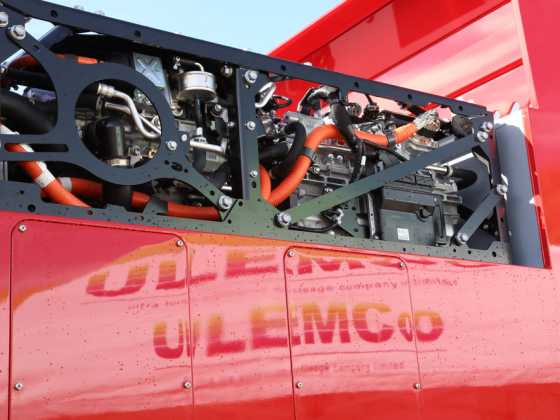How car clubs are providing essential business mobility

GREENFLEET looks at how mobility initiatives such as car clubs can radically reduce carbon emissions – and how the public sector is often leading the way in this area
The cost of buying and running a vehicle, together with traffic issues, parking restrictions and air pollution, is sparking a change in mindset that car ownership is no longer the best option for getting around.
Mobility-as-a-service has been mooted for some time as a way of enabling on-demand travel using multiple different methods. This could involve active transport, public transport, car clubs, and so on. And to make it easier for the traveller, all this information and ways to pay would come from a single app or booking platform.
Recently, Transport for Wales (TfW) has selected Hitachi to help digitally transform public transport within Wales, making it easier for customers to plan, book and pay for different modes of travel.
Over the next five years, Hitachi will deliver a booking system that will include all modes of public transport and be available to customers through a simple app.
Car clubs for business travel
Car clubs are a way to reduce private car ownership for individuals and organisations. They are short-term car rental services that allow members access to locally parked cars and pay by the minute, hour or day.
In fact, CoMoUK said in a 2022 report that each car club vehicle in the UK replaced around 22 private cars.
When it comes to business travel, car clubs are becoming increasingly popular. According to a poll by Collaborative Mobility UK (CoMoUK) of nearly 4,000 Enterprise Car Club members, one in five (20 per cent) members now use the on-street rental service for work-related journeys.
More than half said they would not have been able to get to their destination without a car.
The public sector has shown great innovation when it comes to mobility – either giving residents different travel options such as car clubs – or giving their staff alternative ways to commute or undertake business related journeys.
What's more, many car clubs allow drivers to use the latest environmentally friendly vehicle, such as an electric vehicle (EV), which they may not otherwise choose as their private vehicle. This helps to drive up electric vehicle adoption.
From a staff travel point of view, they allow employees to access environmentally friendly and safe vehicles to travel for work purposes, helping employers with their duty of care and sustainability targets.
One example is the London Borough of Waltham Forest, which has been working with Hiyacar to launch EV car clubs and provide staff with cost-saving opportunities and convenient access to nearby EVs.
In the first two months, CO2 emissions were reduced by 135kg, with projections to save half a tonne from Nov 23 to Nov 24. Despite a five-hour daily booking limit, the programme achieved a successful 52.4% utilisation rate.
East Lothian Council meanwhile undertook a 12-month pilot to reduce grey fleet usage, improve travel efficiency, and cut carbon emissions. Grey fleet usage dropped, saving 0.65 tonnes of CO2, while vehicle utilisation increased by 36%.
Greening the health sector
It is estimated that the NHS’s carbon footprint is estimated to be around four per cent of the UK's carbon emissions. The NHS has committed to reaching net zero by 2040, with an ambition to reach an 80 per cent reduction by 2028 to 2032. One of the ways they can cut down on this figure is by optimising their vehicle numbers.
Norfolk & Suffolk NHS Foundation Trust struggled with managing a its vehicle pool of over a hundred vehicles, as well as their grey fleet miles. Hiyacar's keyless access and real-time tracking optimised vehicle numbers, improved efficiency, and increased utilisation. The initiative cut grey fleet miles by 29%, estimated saving of £53,000, increased vehicle utilisation by 33%, and reduced CO2 emissions by 18.91 tonnes to support sustainability goals.
Car clubs for residents
In August this year, Suffolk County Council announced it will be placing 16 EVs across eight locations as part of a car club which local residents could book by the minute, hour or day.
The vehicles, which will be on the road in summer 2025, aims to help deliver on two of the Suffolk Climate Emergency Plan’s goals; a reduced number of cars on the road and an increased proportion of vehicles on the road that are low or zero emission.
Councillor Neil MacDonald, chair of Suffolk Public Sector Leaders, said: “The project is funded by Suffolk’s public sector organisations, helping deliver on two of the Suffolk Climate Emergency Plan’s goals; a reduced number of cars on the road and an increased proportion of vehicles on the road that are low or zero emission.”
A scheme for care workers
Climate charity Possible, alongside its partners The Care Workers Charity and think tank New AutoMotive, are calling for the government to establish a social leasing scheme for care workers to access electric vehicles at a lower cost.
The organisations argue that in rural and semi-rural areas, care workers cannot realistically do their jobs without a car, and they are routinely required to drive hundreds of miles and are therefore responsible for high transport emissions. The UK’s 900,000 home care workers account for an estimated 4 million miles driven every day, or 1.5 billion miles a year.
Possible said these drivers are significantly contributing to the UK's overall emissions, especially in the case of private cars.
The charity's report found that many care workers are spending at least £100 per month on fuel, with some spending up to £150 or more depending on where they live and have to travel to for their clients.
EVs are typically three-and-a-half times cheaper to run than fossil-fuelled cars, depending on the mileage per gallon rate.
But due to the typically low incomes of care workers, plus their status as contract workers rather than employees, they are typically unable to access affordable finance to enable them to switch to an electric vehicle.
Possible said that a government-backed social leasing scheme could ease this problem, with the government acting as a guarantor for the people leasing the cars.
Helping meet sustainability targets
According to the Department for Transport, there were 767,899 UK car club members in 2023, an increase of 38% since 2020.
With the average UK car club vehicle producing 27% less emissions than the average privately owned vehicle, according to CoMoUK’s 2021 summary report, car clubs play a vital role in helping the UK to reduce its emissions and meet carbon reduction targets.






